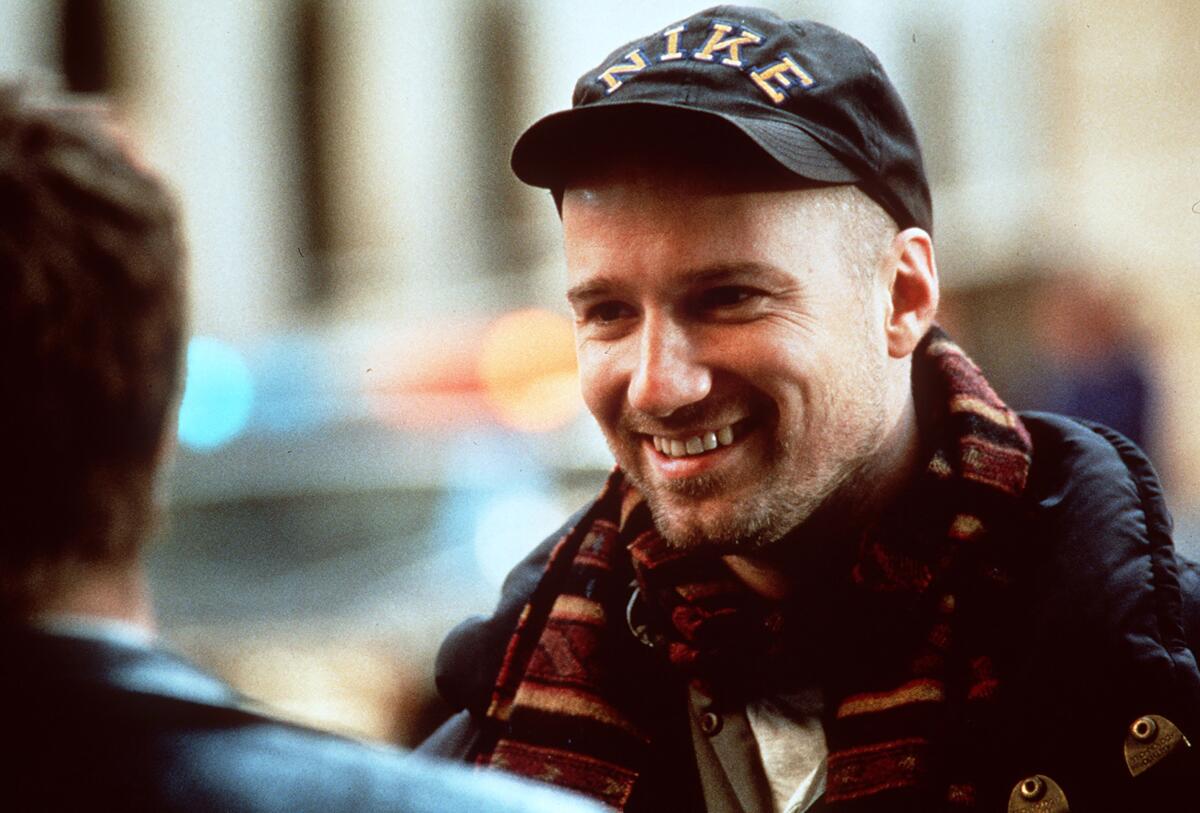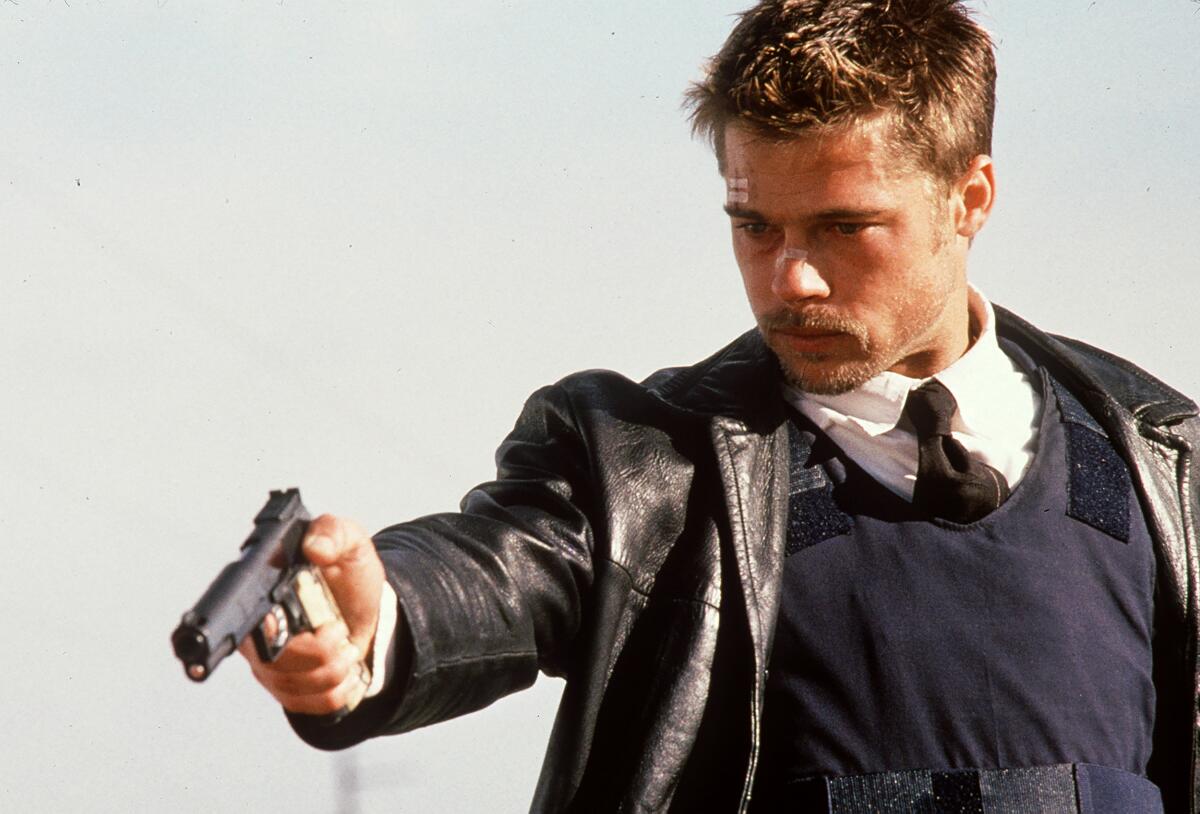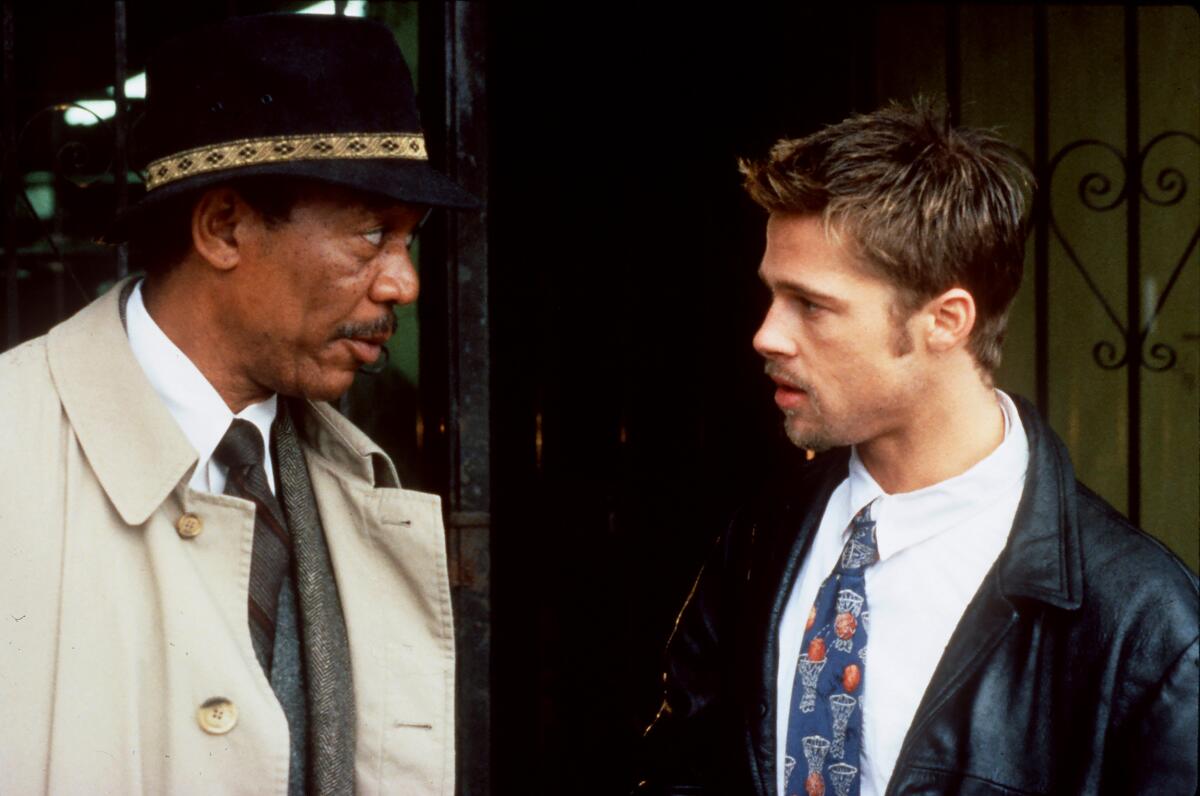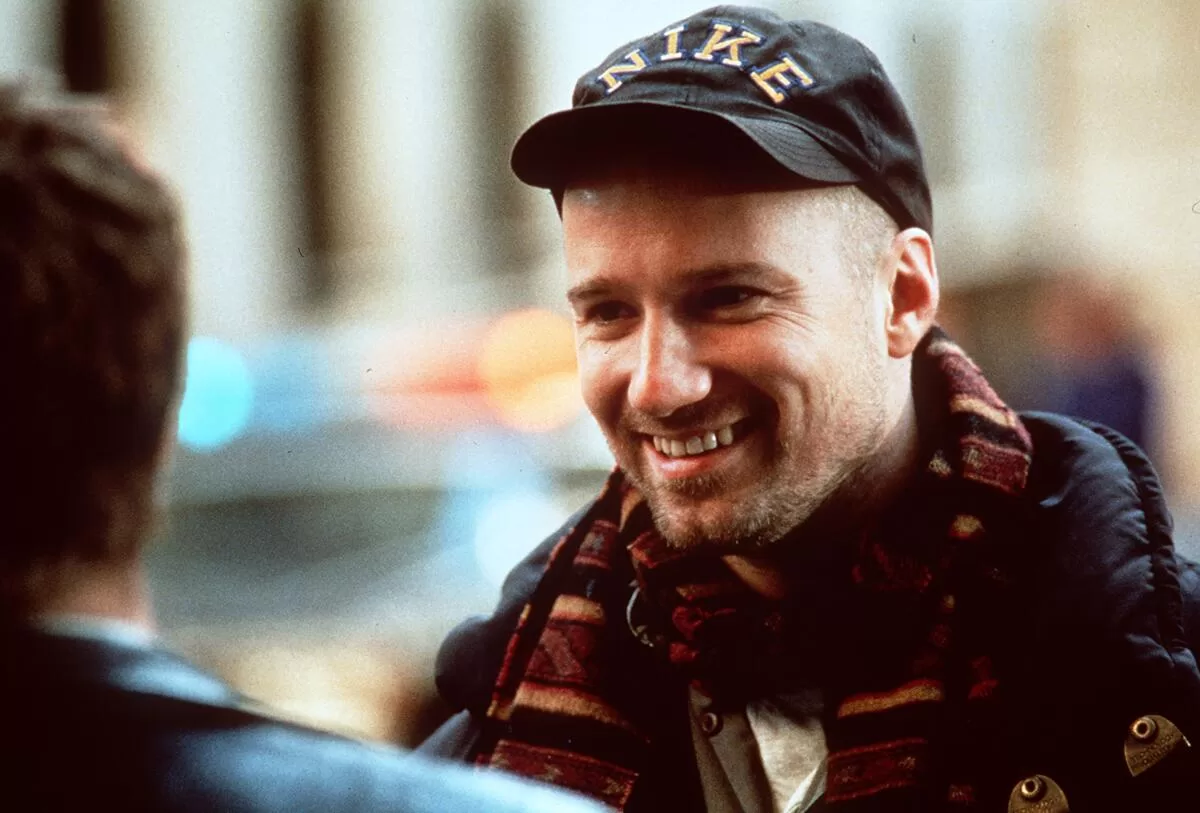But there was Hollywood to conquer and Fincher, not yet 30, rushed headlong into his feature debut, one that no superfan of Ridley Scott (also a genius director of commercials) could pass up: the third movie of the “Alien” franchise. While it has since found a hardcore base of defenders, 1992’s dour, much-mussed “Alien 3,” a troubled production, was a disappointment that Fincher has largely disowned.
A little over three years later, however, he was back with a movie that has since come to define him, even with future Oscar-nominated titles on the horizon. Starring Morgan Freeman and a rising Brad Pitt as two detectives — one deliberate and cynical, the other impulsive and naive — in an oppressively rainy city hunting down a ghoulish maker of tableaus based on the deadly sins, “Seven” yoked Fincher’s gift for atmosphere to Fritz Lang-worthy material that approached metaphysical profundity.
“Who wants to spend their time bitching and moaning about transgressions that were done to you?” says Fincher, 61, of the tough years between “Alien 3” and the breakthrough that cemented his style. “That seems like a waste of time. I don’t think I was persecuted on ‘Alien 3,’ but I definitely learned what my limits were.”

(Peter Sorel / New Line Cinema)
The story of his rebound, though, remains a valuable one, even if the director himself would rather move on. In advance of Friday’s world premiere of a newly remastered 8K Imax version of “Seven” at the TCM Classic Film Festival, it feels like time to tell it again. Fincher is in a sharply funny, self-deprecating mood — his typical M.O. — when we connect on Zoom from his Los Angeles offices, he in a gray baseball cap.
“Seven” followed “Alien 3,” which was a very difficult experience for you. Ultimately, you were removed from the ‘Alien 3’ edit and the film was taken away from you. How hard was it for you to consider making another movie?
I had gone back to what I was doing before 20th Century Fox called: commercials, a couple of music videos. And then I accidentally got sent the script to “Seven.” And remember, there’s so few scripts that you read in this business where you go: What just happened?
What specifically surprised you?
I’ve told Andy [“Seven” screenwriter Andrew Kevin Walker] this — he’s forgiven me. But when I got it, I was like: Old cop/young cop? I don’t know. And I called my agent and I said, “I’m not interested in this whole last seven days of a homicide investigator.” And he said, “Just get to the end.” So I went back and I was reading it and I got to the part where John Doe gives himself up, covered in blood, and I’m holding this thing in my hands, so I know there’s like 18 pages left. Not a lot. There’s less than 20 minutes left in the movie. How can you have the guy that everyone’s been chasing give himself up? And I remember being in an agitated, elevated state going: Wait a minute. This can’t happen. I don’t have experience with a narrative that can reinvent itself in the last 20 pages. And then I got to the head in the box and I was like: Count me in.
The ending is a radical one, especially in the context of ’90s Hollywood filmmaking. But how did you know after “Alien 3” that you weren’t going to get screwed over again?
Listen, “Alien 3” was a $60-plus-million movie. When it’s a big franchise movie, there are a lot of interlopers, a lot of people watching how things get spent. And when you’re making a dirty, skeevy little serial-killer movie for New Line, there’s a lot less oversight. I think everybody came into it thinking, “Oh, my God, this is that problem child from the ‘Alien’ movies?” And then, six weeks into it, they were like: “He is consistent. We’re watching the dailies and we like what we see.” So maybe that was then and this is now?
You’re talking about projecting a kind of confidence. Did you always have that?
Yeah, I’ve never been lacking for confidence, only because everybody makes mistakes. I’m going to make mistakes. The thing was, with “Alien 3,” I never liked being forced to make other people’s mistakes. I want to believe in the thing I’m doing. And [with “Seven”] I finally had a piece of material that expressed that. The kind of movie I wanted to see. I like movies that challenge me, movies that make me go: Really? You want to get this close?

Brad Pitt in David Fincher’s 1995 movie “Seven.”
(Peter Sorel / New Line Cinema)
This was your first movie with Brad Pitt, whom you would go on to work with on two more films, “Fight Club” and “The Curious Case of Benjamin Button.” How tricky was it to cast your detective duo?
Oh, boy. They really wanted Al Pacino, and Al Pacino said no. I got involved after that. And I think the first person I spoke with was Gene Hackman. I went to meet Gene Hackman, who I was entirely intimidated by because, for my money, he might be the greatest motion picture actor of all time — just the kind of effortlessness, well-traveled humanness was something I really wanted. And I met with Gene and he said, “It sounds like there’s a lot of night shoots.” I think we had a 40-minute conversation. And I said, “Yeah, there is.” He said, “Count me out.” So that was that.
Then I had had a meeting with Brad. I called my great friend and partner at Propaganda, Dominic Sena, who had directed him in “Kalifornia.” And I said, “Tell me about this Brad Pitt guy.” And he said, “You’re going to love him — so much fun, so honest, so on it. He only wants to do stuff that’s interesting.” So we met at a coffee shop and out of that, a deal was imminent. I think it was within 48 hours, they closed that. And then [producer] Arnold Kopelson called me and said, “What do you think about Morgan Freeman?” I had a phone conversation with Morgan and he said, “I would love to be in this.” And I said, “Really? There’s a lot of night shooting.”
At least you learned to ask. Let’s talk about another key collaborator you had on “Seven,” cinematographer Darius Khondji, whose lustrous work is extraordinary. How did he come on board?
He had done a condom commercial that was just astoundingly beautiful. And we had done a package of spots for Nike in Paris. But it was down to the wire because New Line’s big worry was: Why do you want to get a guy who shoots perfume commercials to do a serial-killer movie? And I was like: Because of what you just said, because I want the movie to be really beautiful at the same time that it’s utterly dystopian. The thing that Darius does so incredibly well is he has a real sensitivity for how light falls on the human face. It is not difficult to make a room really dark and creepy-looking. It’s difficult to figure out where the light’s going to come from to hit the person who’s moving through that dark, creepy room so that they have real weight and power.
But the production ran into problems, right? It was slowed by bad luck.
Some bad stuff happened. It was El Niño and there was an awful lot of rain. So we ended up having to make an executive decision. And I know that there are dorks out there with their YouTube channels going: Why does it have to rain? It’s because we had to put together five days of continuity shooting during El Niño.
So that’s not some kind of gloomy “Blade Runner” homage. It’s just to make the footage match?
Precisely. And it’s expensive to have giant tankers filled with water. It’s hundreds of thousands of dollars a week. There was a lot of resistance. I was like, “This is New Line, isn’t it?” But people got with the program. I remember [New Line executive] Lynn Harris, who I adore, had the unenviable position of coming down on the day when we were shooting the gluttony murder. And we had 30-gallon trash bags filled with cockroaches that had to be spilled onto the floor and then we would see them scatter. And she was there for about three hours and then decided: Somebody’s getting fired over this and it’s not going to be me [Laughs]. This is a joke. This is the kind of stuff that David normally says with a smile on his face to be funny. I have to say that.
You kid, but the test screenings for “Seven” were notoriously awful.
Disastrous. I think we scored in the 50s, which normally tells you that that movie is going on the shelf. Joe Farrell [founder of NRG, the company that introduced market testing to studios], and his band of merry men was one of the more pathetic scams in Hollywood for so many years. I think we tested the movie in Long Beach. And I remember arriving and saying, “Listen, just for my own edification, I’d love to see the flier that you used to amalgamate this crowd that’s going to see this thing tonight.”
And they said, “OK, fine.” And they brought me this little five-by-seven-inch card that said: “Would you like to see a new movie starring Brad Pitt (‘Legends of the Fall’) and Morgan Freeman (‘Driving Miss Daisy’)?” It made no sense to me. You’re not going to market this movie to the people who like “Driving Miss Daisy.” That’s not a correlative. There’s no connective tissue. There’s no relationship between these experiences, much less the kind of storytelling that we’re asking the audience to immerse themselves in.

Morgan Freeman, left, and Brad Pitt in David Fincher’s “Seven.”
(Robert Isenberg / New Line Cinema)
How did you recover from a screening like that? What happens next?
There was a moment when we had shown the movie, they were underwhelmed and nervous, and there was a big meeting convened at New Line in one of the massive conference rooms. One of the producers who’s no longer alive, her big idea was that Brad and Gwyneth Paltrow have these dogs that live in that tiny little room in their apartment. And she was convinced that the thing that would send him into apoplectic, inconsolable sorrow was if the German shepherd — if that was the head in the box. And we were all kind of like: Really?
By the way, remember that we did not have the helicopter footage yet, and I think I had two nights to shoot the end. So I came to them after this horrendous screening when we got the notes from the audience that said I wouldn’t recommend this movie to my worst enemy. And it was discussed whether I should continue on with the movie and whether or not we should shoot animal heads or whatever.
You’re right back to the nightmare of “Alien 3.”
I remember at the end of this meeting, I turned to [New Line production president] Michael [De Luca] and I said, “I want to see you in your office across the hallway.” And we got up and we left and we went across the hall into his office and we closed the door. And I said, “Dude, we talked about ‘Klute.’ We talked about ‘The French Connection.’ We talked about the kinds of movies that we wanted to make. And I’m telling you, this movie is a good movie. It will be if we can complete the intention. And I need the money to finish this, and I’m coming to you and saying if you support this, I know I can make a better movie than what we screened.”
And he thought about it — and this kid’s 30 years old — and I remember he said, “OK, here’s what we’re going to do: You’re going to continue to shoot. Tell them you need five days. Shoot what you need. Get your helicopter shots. You keep going. Do what it is you need to do. I’ll sign the P.O.s.” And so that’s how we got another 11 days of shooting.
Do those kind of producers exist anymore?
Sure they do. They absolutely do. I think you have to understand that the conceit of it was you are sold a thriller, but it really becomes a horror movie. And by that, I mean horror movies at their essence are about things that you can’t control. You can’t control Michael Myers, you can’t control Bruce the Shark, you can’t control Linda Blair. That was a really compelling and interesting puzzle box to work your way out of. Mike had my back. We talked about it and he really stood by what it was that we were trying to do.
Have you made peace with how large “Seven” looms in your filmography? Even when you were releasing something like last year’s “The Killer,” it’s always: Fincher’s back to what he does best. Do producers want you to repeat yourself?
Look, I’m happy about that. I like the movie. I went through that with Warner Bros. on “Zodiac.” They were like, “Well, this isn’t scary.” And I was like, “There are people who might disagree with you on that.” I got blue in the face saying “This is not ‘Seven.’ This is a 35-year cross between ‘All the President’s Men’ and ‘River’s Edge.’” I’m sure there are people who would love to be able to hire you to do that thing that you did for New Line back in the mid-’90s, but I barely remember what that was. Hopefully we’ve all moved on.
Do your fans only want to talk “Seven” with you?
No. When you make the kind of movies I make, not a lot of people go: “Let’s talk about ‘Zodiac.’” The ones who really want to talk about it are probably on a watch list somewhere.
You’re 100% wrong about that. Are you on a watch list for making all these movies — and then returning to them decades later with Imax versions?
God, I would hope so. We used to joke that by the time “Seven” got to its fifth weekend, anybody who was there during the matinee, just slap the cuffs on them.
This interview has been edited for length and clarity.
